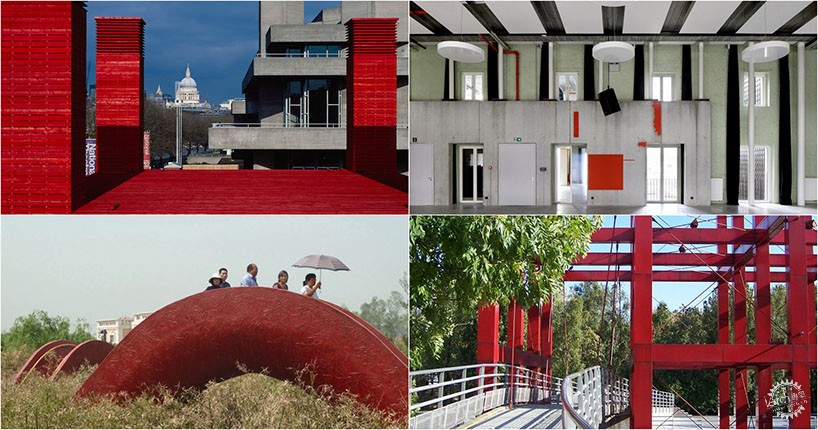
遇见红色:色彩对建筑的视觉增强作用
Seeing Red: 4 Times the Color Has Enhanced Architecture and Why
由专筑网李韧,吴静雅编译
红色无处不在,例如停车指示标,亦或是口红与红酒,这种不断在日常用品中出现的色彩在人们的脑海中形成潜意识。红色有时能够与背景很好地呼应,但是人们为什么会为之吸引?为什么古老的穴居人民会选择使用赭石色墙体?为什么红色能象征革命?为什么大型场合需要红毯,而不是绿色或者蓝色?虽然这些问题的答案至今都无人能解,但红色在建筑中的运用总是经过精心设计。
红色象征着热情、危险、革命、繁荣,以及爱情,不同的含义使颜色的运用方式也更为慎重。建筑师常常将它用作某种工具,来唤起某种意识。以下是运用了红色的建筑项目:
Red is everywhere. From stop signs to bricks and lipstick to wine, our constant use of the color in everyday objects has slowly taken over our subconscious. Red is a color that always blends with the context, telling us how to feel or what to think, but why are we attracted to it? Why did cavemen choose ochre-based paint to draw on their walls? Why do revolutions always seem to use red to stir support? Why do we parade celebrities down red carpets, when green or blue would surely do the same job? While the answers to these questions may be vague and indefinite, red’s use in architecture is almost always meticulously calculated.
Simultaneously symbolizing passion, danger, revolution, prosperity, and love, the various interpretations of the red make it one of the most deliberately-used colors in architecture. Architects regularly use it as a tool to tell a story or evoke a specific reaction. Here’s a list of projects where the color red has been effectively implemented.
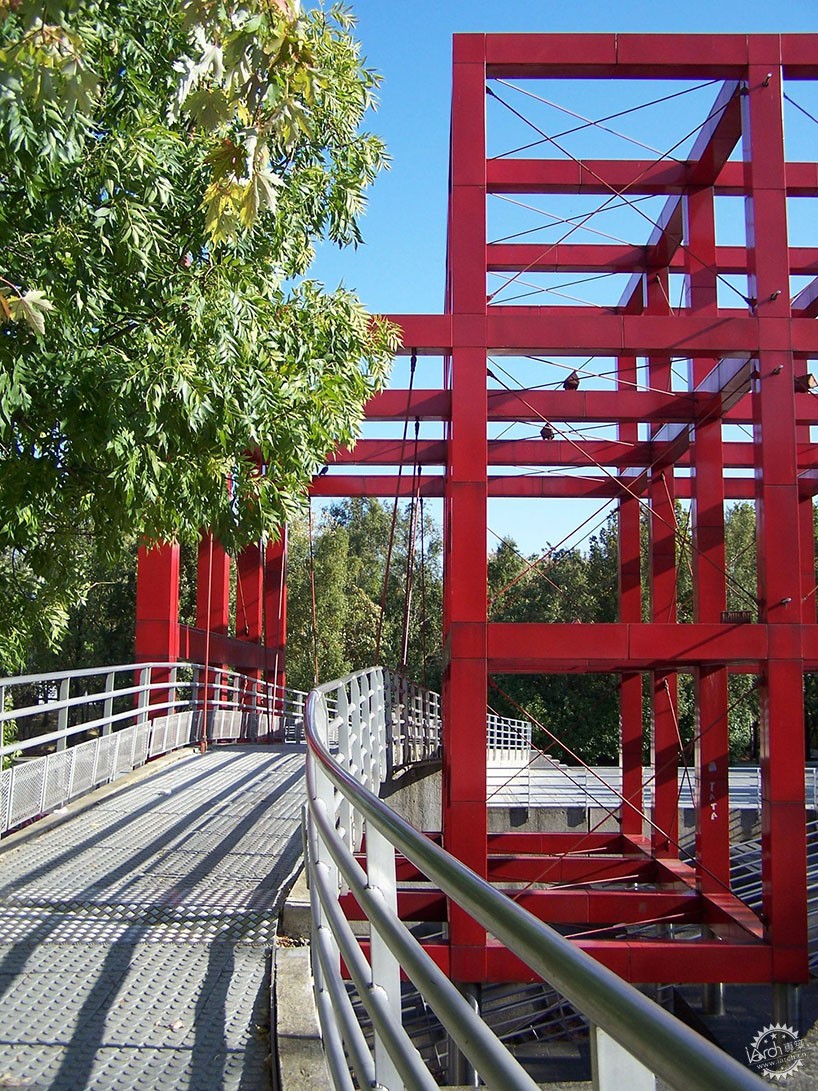
licensed under CC BY-SA 2.0. Image © nenamaz
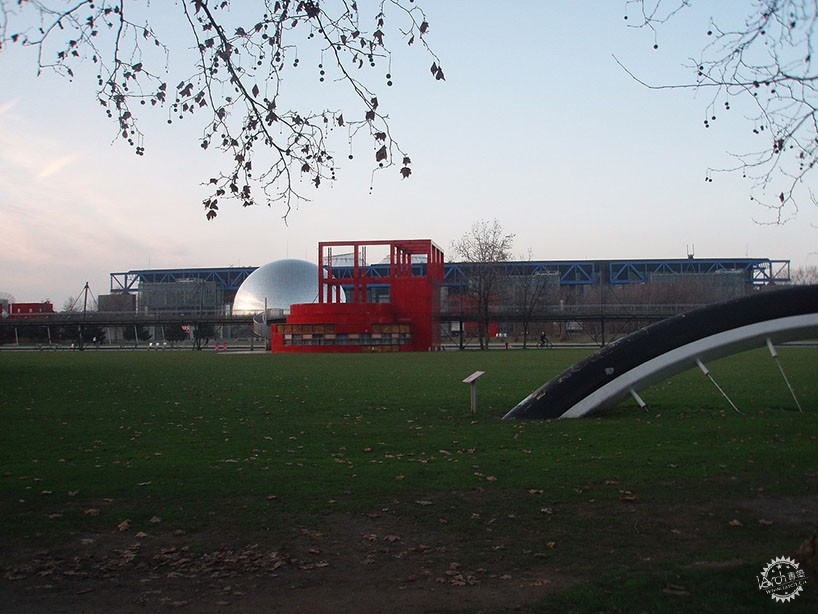
licensed under CC BY-SA 3.0. Image © urskalberer
拉维莱特公园 / 伯纳德•屈米
也许没有其他建筑师能比屈米更懂红色。屈米一直认为红色是其作品的核心部分,他相信,红色不仅仅只是一种颜色,还代表了一种理念。在其作品拉维莱特公园中,红色的运用既表达了历史内涵,也表达了设计理念。在巴黎,这里曾经是法国肉类批发市场(French National Wholesale Meat Market)和屠宰场,因此,这些解构主义作品的生成及色彩都与场地的原始功能有关。另外,红色能够将游客吸引至屈米精心设计的互动空间里,这类似于花朵通过美丽的色彩来吸引蜜蜂与蝴蝶,因此,这些建筑也代表着当地的社区感。
Parc de la Villette / Bernard Tshumi
There may not be an architect more synonymous with red than Bernard Tshumi. Consistently using red at the core of his work, Tshumi believes that ‘red is not a color,’ but instead an idea. In the case of Parc de la Villette, the choice of using red carried both a historical and conceptual significance. Located in Paris, the site used to be home to the French National Wholesale Meat Market and Slaughterhouse; hence the crimson, bloody facades of the various deconstructivist follies reference to the former function of the land. More importantly, red draws visitors towards the spaces where Tshumi hopes to initiate interaction - similar to how flowers use their color to encourage pollination - acting as a beacon to gather members of the community.
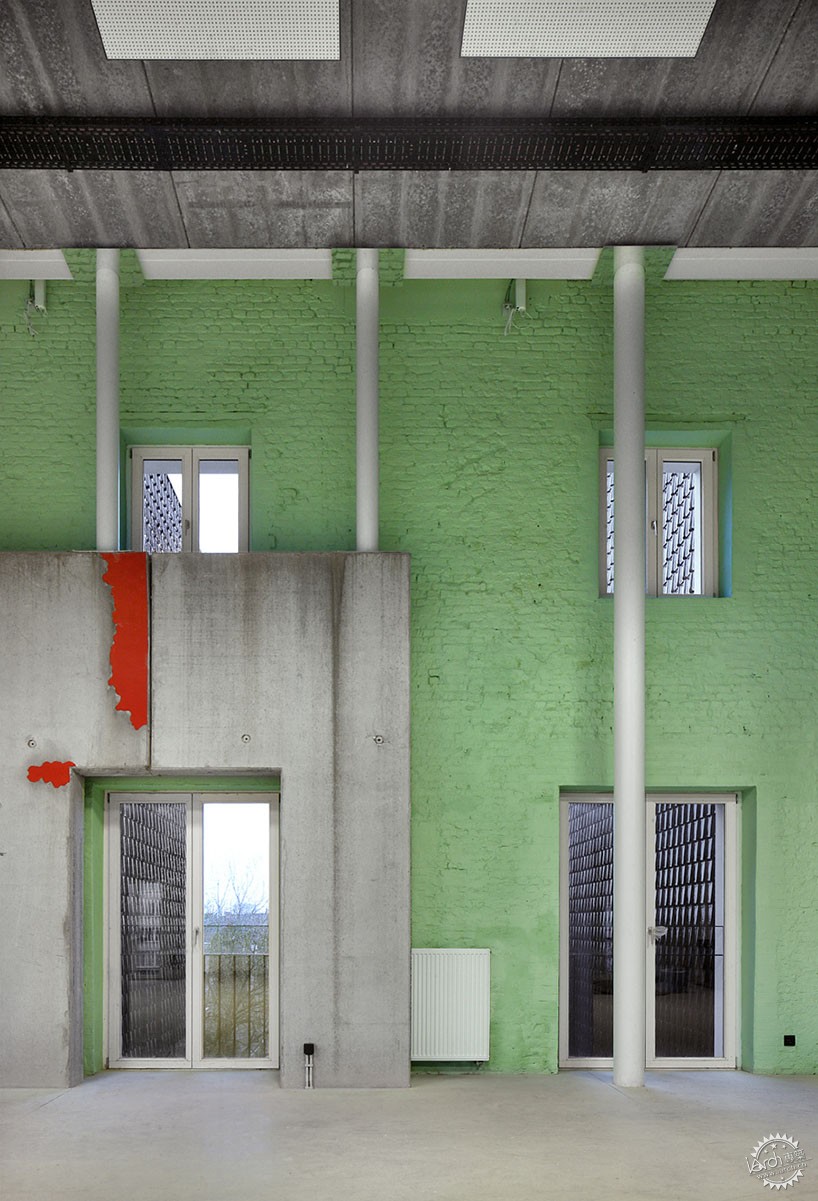
Courtesy of architecten de vylder vinck taillieu
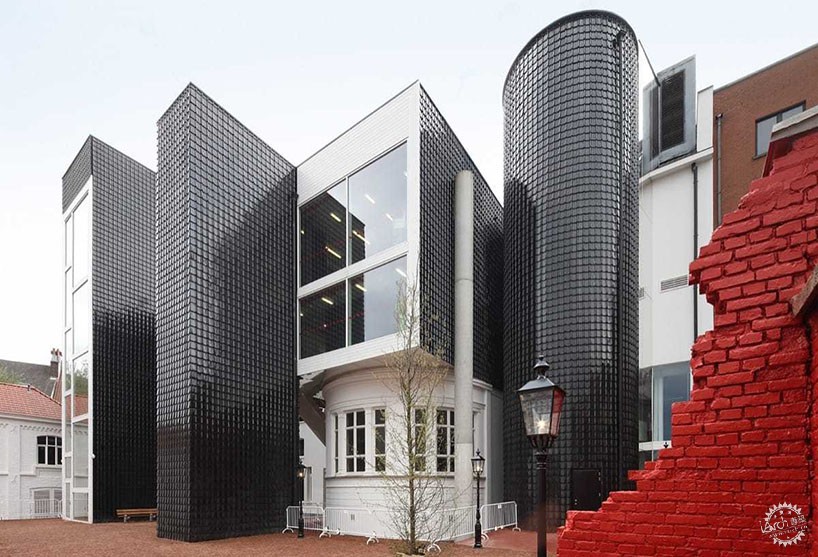
Courtesy of architecten de vylder vinck taillieu
DC L-Berg / Architecten de Vylder Vinck Taillieu
比利时建筑师de Vylder Vinck Taillieu也常常运用色彩来强调方案的某些部分,例如运用绿色来表达结构,或运用白色来表达旧建筑中的新构件。然而,最吸引眼球的也许是DC L-Berg的扩建项目,在该项目中,他们在这里用红色突出显示了在每个施工过程中所犯的许多错误。将整个加工过程视为一项有趣的冒险活动,dVVT通过红色的戏谑特征来表达一些轻微的瑕疵,例如混凝土的各种误浇,还有管道的不规则定位,以及墙体上的红色标记。
Belgian-based architects de Vylder Vinck Taillieu often use color to emphasize parts of a scheme, whether it’s green to show structure or white to show new inserts in old buildings. Most striking, however, is their renovation and expansion of DC L-Berg, where they use red to highlight the many mistakes made during each construction process. Treating the entire finishing process as a fun venture, dVVT embrace the slight imperfections and in doing so emphasize the playful side that red can bring - almost putting a clown’s nose upon the various mis-pourings of concrete, the irregular positioning of pipes, and several red tape marks on the walls.
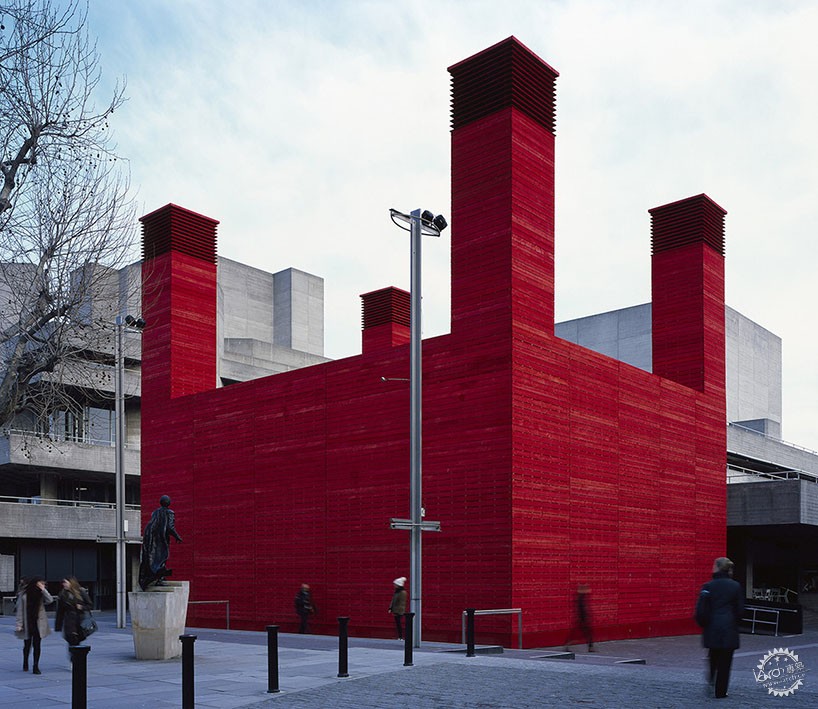
© Helene Binet
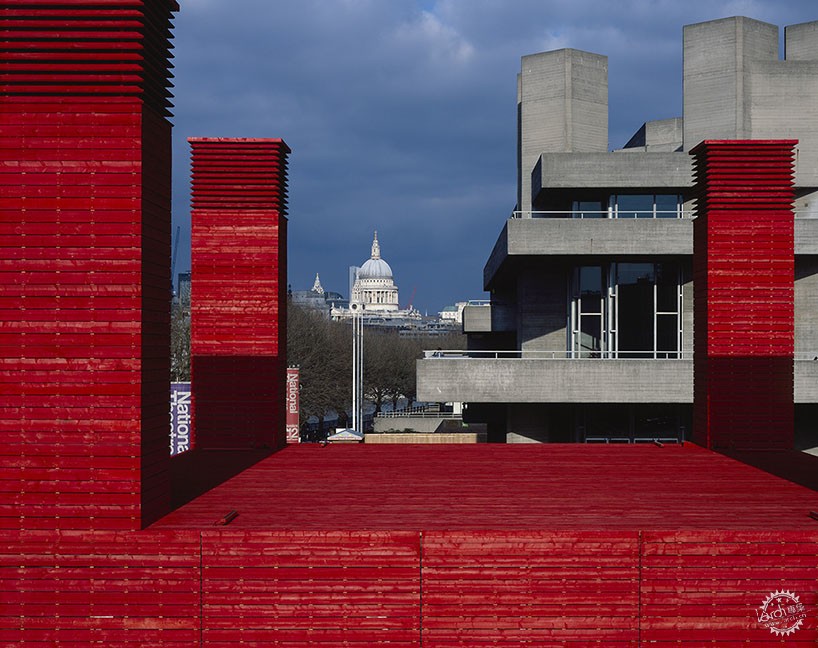
© Helene Binet
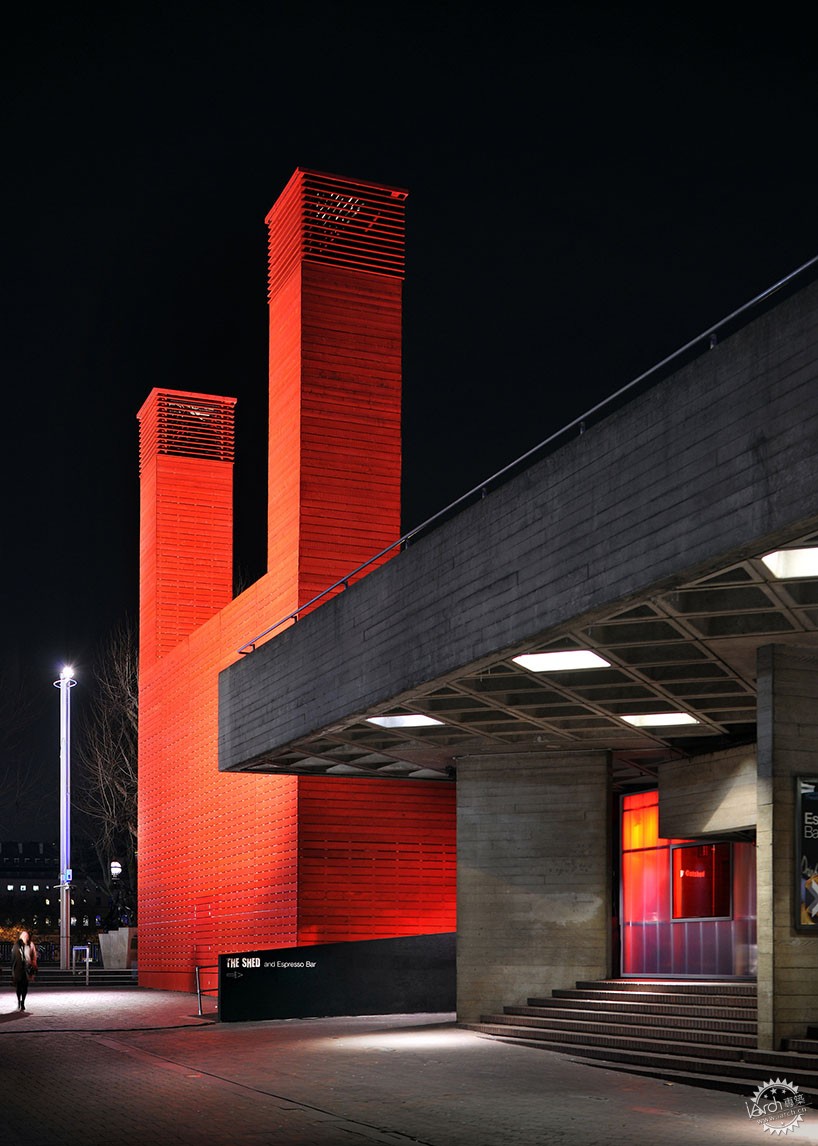
© Philip Vile
英国国家大剧院红色临时场馆 / Haworth Tompkins
该项目位于英国伦敦国家剧院的旁侧,是一个临时的表演空间,建筑的深红色面板与周边的白色混凝土形成对比,表达了令人震惊且神秘的存在感。建筑师Haworth Tompkins通过红色墙体唤起戏剧帘幕的象征含义,并且将舞台由内至外完全展示出来。就人们的心理而言,红色能够唤起力量、爱情、激情、欲望等强烈情感,而这些情感则常常通过舞者在舞台上的表现而演绎,因此这座建筑自身也成为了这些情感的象征。
The Shed / Haworth Tompkins
A temporary performance space located beside the National Theatre in London, UK, the Shed’s deeply stained crimson planks have a “startling and enigmatic presence,” boldly contrasting the surrounding pale concrete. In the brave choice of color, Haworth Tompkins play on the symbolism of the red curtain in theatre, moving the grand reveal of the stage from the interior to the exterior. Psychologically, the intense emotions that red evokes - power, love, passion, desire - are all emphasized on the stage during a performance, allowing the building itself to make a statement befitting of its function.
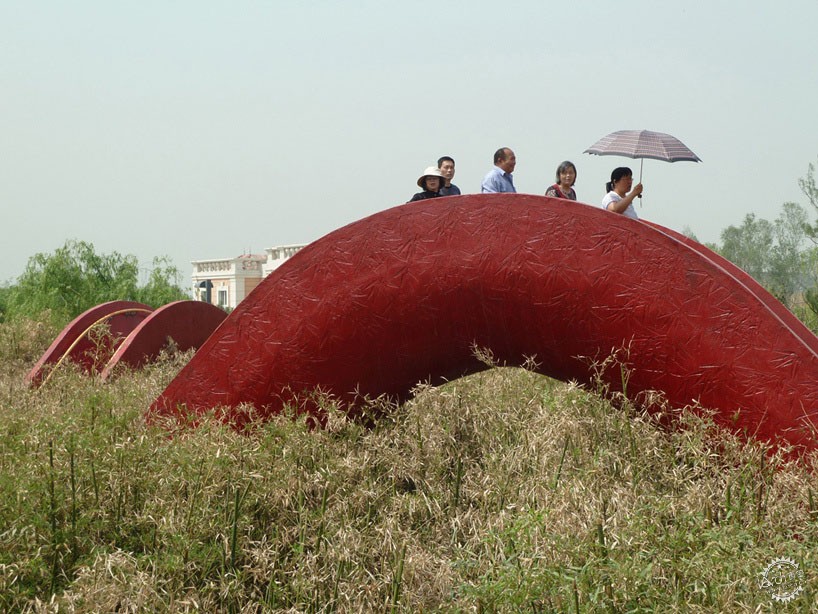
Courtesy of West 8
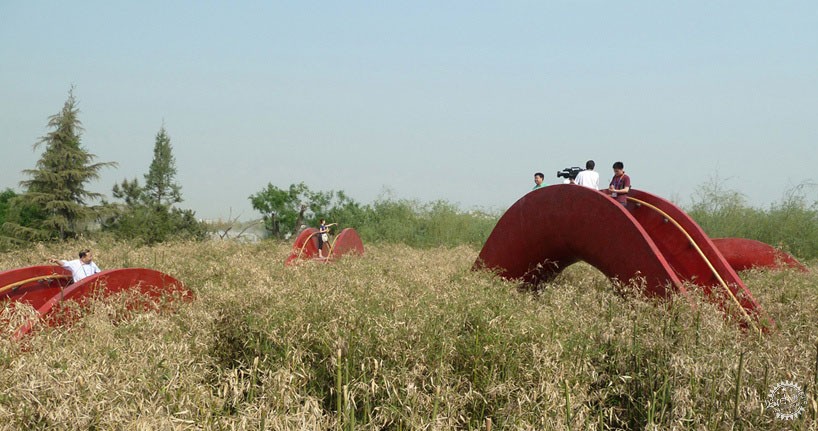
Courtesy of West 8
万桥花园 / West8
就亚洲而言,红色更具内涵。在中国文化中,红色代表着财富、欢乐与幸运,因为在中国传统的陶器与艺术之中,艺术家们几乎用的都是赭石色颜料。在2011年西安世界园艺博览会中,荷兰West8事务所便运用红色描绘了一幅代表希望与成功的画卷。建筑师设计了5座环形红色桥体,象征着未来的繁荣与昌盛,并且通过红色来表达建筑与城市的连接。与其他项目所运用的红色相比,该项目的红色更为纯粹,并且融合微妙与自然的美学理念,在其中,人与自然完美地融合。
“花园似乎在诉说着一个故事,他们将诗歌与故事结合,万桥花园似乎代表着人的一生,人生就是这样一条道路,其中充满了未知与负担,但同时也有兴奋与喜悦。花园的设计让你走在这条蜿蜒如迷宫般的小道上,同时感受人生的崎岖,也让你找到通向自然的道路,让你走过人生的无数座桥。”
Garden of 10,000 Bridges / West8
Across Asia, red has a great significance. Chinese culture portrays it as the color of wealth, joy, and luck, in which the country’s earliest pottery and art show an extensive use of ochre-based dyes and paints. Capturing this historic culture, the Garden of 10,000 Bridges by Dutch-based firm West8 paints a picture of hope and success. Built as part of the Xi’an Horticultural Exposition in 2011, the five circular, red bridges suggest infinite prosperity, using the cultural symbolism of a color to connect with the community around it. In contrast to the synthetic reds of other projects, the use of red within the render creates a more subtle, natural aesthetic, where the human interventions seamlessly blend into nature.
“Gardens tell a story. They combine poetry and narrative. The Garden of 10,000 Bridges represents the human life; the path of people’s lifetime, which is a route of uncertainty and burden, but also of highlights and elation. The garden design takes you on this walk of life as a meandering, winding trail – continuous and like a labyrinth. It lets you find your way through nature and takes you over 10,000 bridges”
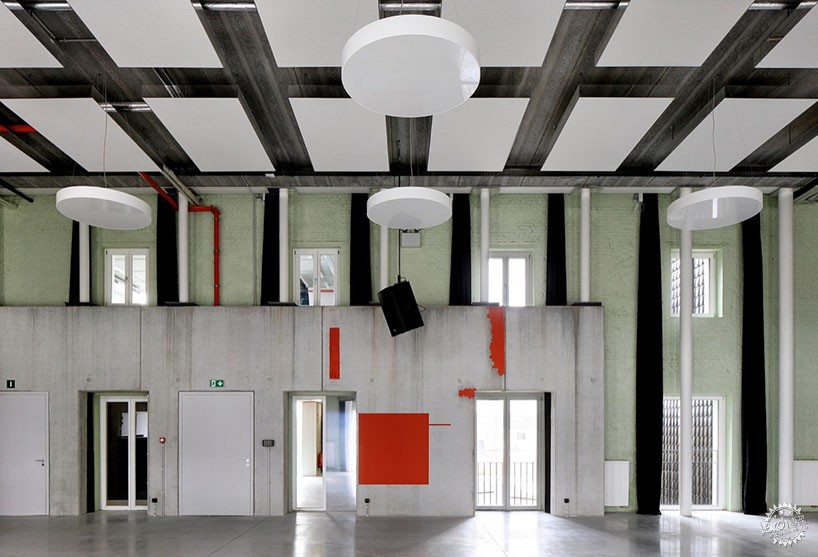
© Filip Dujardin
|
|
